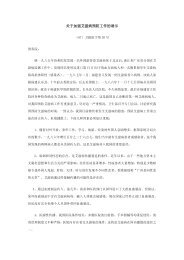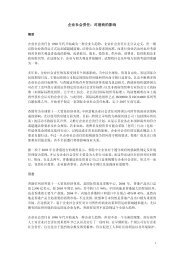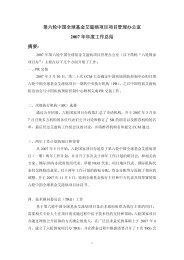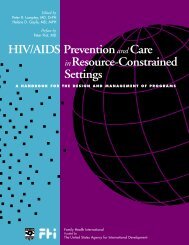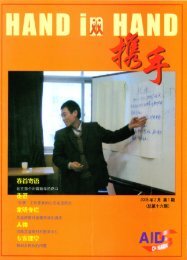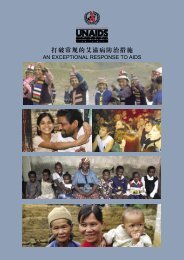The Training of Trainers Manual - UNFPA
The Training of Trainers Manual - UNFPA
The Training of Trainers Manual - UNFPA
Create successful ePaper yourself
Turn your PDF publications into a flip-book with our unique Google optimized e-Paper software.
<strong>Training</strong> note<br />
<strong>The</strong> following are examples <strong>of</strong> how to learn about the community and avoid activities<br />
that may upset them:<br />
▼ Find out what issues might concern the organization with which you will be working.<br />
▼ Conduct an assessment <strong>of</strong> the target community if one is not available. Find out<br />
whether young women will be able to participate in your programme or what<br />
barriers may prevent them from doing so.<br />
▼ Discuss with the leaders or the administration <strong>of</strong> the organization you will be<br />
working with which topics you propose to cover and how they will be taught.<br />
▼ Move into the discussion on issues <strong>of</strong> sexuality and gender gradually and with care.<br />
▼ If possible, organize a training session for the administration so that they can better<br />
understand the problems you are addressing (e.g., reproductive health, gender<br />
biases).<br />
▼ If you are working with young people in a school, first try to inform or train the<br />
administration, then the teachers, and then the parents, before going on to the<br />
training programme for young people. In this way, you will obtain input and approval<br />
from the community.<br />
▼ To show your respect for the community in which you are working, ask for feedback<br />
about how the programme has been received.<br />
Working with religious leaders<br />
It is very important to consider the religious teachings and norms that influence the target<br />
community with which you will be working. Peer education programmes are <strong>of</strong>ten more successful<br />
if religious organizations and leaders have collaborated in developing the curriculum and materials.<br />
If the leaders are properly sensitized to and educated about the target group’s needs (for example,<br />
they have seen the results <strong>of</strong> needs assessments) and issues (having heard about them personally<br />
from the affected group), they may become important allies in helping you achieve your programme’s<br />
educational objectives. It is particularly important to seek out religious leaders who are gendersensitive,<br />
since their support can contribute greatly to enabling young women and young men to<br />
participate equally in your programme.<br />
Historically, religious leaders have been expected to help counsel and support people who are ill.<br />
You should take a sensitive approach in helping them see that by advocating for education, they can<br />
also help prevent people from becoming sick in the first place. When they understand this, religious<br />
leaders and experts can also help you to justify why it is important to address reproductive health<br />
matters by explaining where and how religious teachings permit such education.<br />
58 <strong>Training</strong> <strong>of</strong> <strong>Trainers</strong> <strong>Manual</strong>



